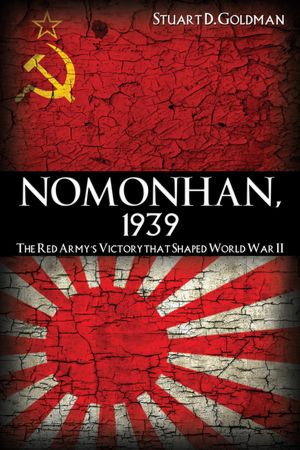My history book club discussed Nomonhan, 1939: The Red Army's Victory That Shaped World War II last night. The author, Stuart Goldman, is a member of the club. (We had never before in the ten year history of the club discussed a member's book.) I have previously posted a review of the book.
The book tells the story of a limited war between Japan and the USSR in the Summer of 1939. The first clashes were over a border dispute caused by the shift of a river channel which might have allowed Japanese troops in Manchuria to block Soviet shipping from the USSR Maritime Provence. The larger, later clash was over disputed territory that the Japanese military feared might serve as staging ground for a Soviet invasion to seize valuable territory in Manchuria. Recall that Japan had obtained domination of Manchuria in the 1930s and was dependent on its coal and steal.
Why is a border war in east Asia important? First, it saw tens of thousands of casualties on both sides. Then, it directly influenced Soviet and Japanese foreign policy, and indirectly German, English and French policies. It is also an example of conflict between major powers that was successfully limited, not escalating into a full fledged USSR-Japan war (recall that a Russo-Japanese war did occur earlier in the century). This book makes these little known events and their importance available to a wide readership.
Stuart wrote his doctoral dissertation on the topic of this book using -- among other materials -- the records of Nazi-Soviet negotiations in 1939, records that were published after World War II. He sought to publish a book with his research after a post-doc year spent in Japan learning Japanese and exploring the Japanese records of the conflict. That book was written when Stuart was a young university faculty member, but never published. He also speaks Russian and spent several decades at the Congressional Research Service where he had exceptional opportunity to study the materials from Russian archives that had been obtained by the Library of Congress during glasnost. He has honed his writing skills with hundreds of CRS reports and magazine articles. He brought all this experience to writing the present book for a general audience, producing something far more than just another book for a narrow audience of academic peers.
The discussion at the club meeting was exceptionally rich. About 20 people attended, almost all having read the book attentively. Stuart began the meeting with a brief summary of the book, but was mostly devoted to questions and answers. He was able and willing to share with fellow club members information that he had obtained in research that was not appropriate for publication; he also briefed us on the topic of his next book.
Nonmonhan, 1939 is relatively brief, presenting a carefully selected set of background facts and information about the battles themselves. It describes how the conflict affected Soviet policy in the negotiations that led to the German-USSR non-aggression pact of 1939. The events also influenced Japanese policy makers as they made a final decision to join Germany and Italy, and to make war against France, the British Empire and the United States. Marshal Zhukov, the leader of the successful Soviet forces went on from this victory at Nomonhan to lead the Soviet resistance to German forces attacking Moscow.
The book illustrates that both the Japanese and Soviets were willing to sacrifice men in great numbers to achieve their objectives, and that each army could inflict major damage. Those lessons became clear to the world during World War II, but might have been learned at Nomonhan had other countries been watching.
We found ourselves in the meeting discussing Stalin's purges and the strengths and weaknesses of the industrial systems of the Soviet Union, as we discussed the dangers inherent in the "lead from below" philosophy of the prewar Japanese army and from the Japanese military dominated prewar government.
I found this to be a very good book -- well researched, well documented, and well organized. One of our members mentioned that she normally didn't like books on these themes but found this a real page turner. The book club meeting was lively and made the book still better.


No comments:
Post a Comment